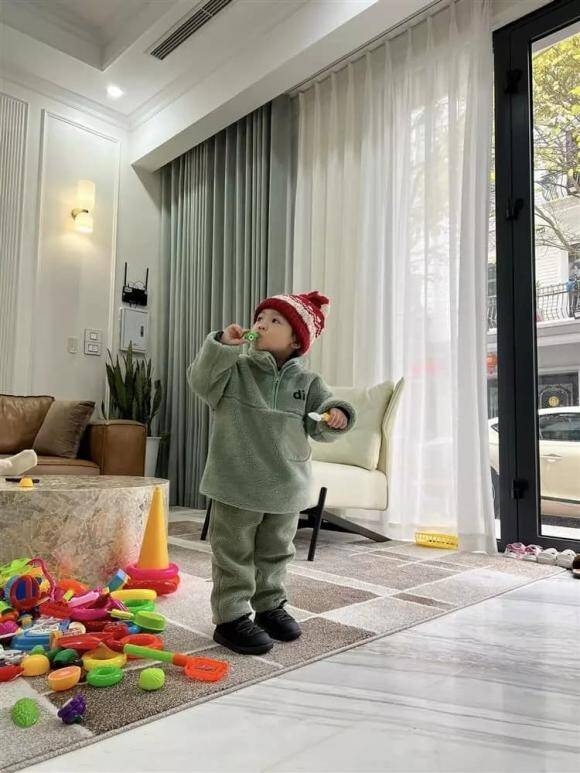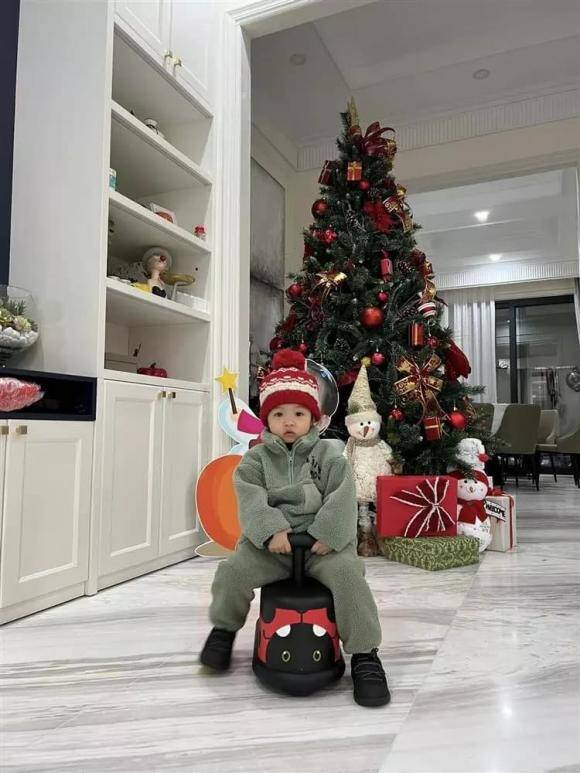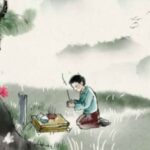

As they resumed their social media activities after a period of silence due to a family crisis, Cường Đôla and his wife have been sharing more frequent updates about their children and family life.
This indicates that right after celebrating New Year in Saigon, Đàm Thu Trang took her two young children, Suchin and Sutin, to visit their maternal grandparents in Lạng Sơn province as the Lunar New Year approaches.

Suchin often gets to visit her maternal grandparents, thanks to her mother.

While Suchin, the older sister, has visited Lạng Sơn several times before, this is the first time for her younger brother, Sutin. “On his first experience of the cold weather in my hometown, my son is super excited”, shared Đàm Thu Trang about her son’s emotions.
This seems to be an annual tradition for the mother of two. In previous years, before the birth of her son Sutin, Cường Đôla’s wife often took her daughter to visit her hometown in Lạng Sơn during holidays and Tet festivals. The daughter of the billionaire Cường Đôla seems to enjoy the fresh air of her maternal grandparents’ home, which is very different from the bustling city of Saigon.




While Đàm Thu Trang and her children are enjoying their early 2025 vacation in Lạng Sơn, Cường Đôla stays in Saigon with his son, Subeo. The father expressed his regret at missing his family during the first dinner of the Year of the Snake, especially his “little man.”
“The first dinner of 2025 for the men in the house. There are three of us, but the youngest is still at home with his bottle and can’t join his father and older brother yet” – the businessman wrote.
Cường Đôla invited his son Subeo to dinner without his younger brother Sutin.
Although Cường Đôla stayed in Saigon for work and to take care of his son, Subeo, he still showed his concern and longing for his two “golden children.” So, during a business trip to the North, the father immediately went to Lạng Sơn to reunite with his wife, Đàm Thu Trang, and their children.
Despite the busy end-of-the-year schedule and the young age of their children, Đàm Thu Trang and Cường Đôla tried their best to arrange for their children to celebrate Tet with both their maternal and paternal grandparents. This is a delicate arrangement that not all parents can achieve.
Tet is one of the most important and meaningful holidays in Vietnamese culture. For children, spending time celebrating Tet with both maternal and paternal families not only allows them to experience the festive atmosphere but also contributes to building family relationships and creating memorable memories. Here are some reasons and ways for parents to achieve this:
1. Affirming Family Values
Celebrating Tet with both maternal and paternal families helps children feel the connection within the family. They will understand that each family has its own traditions and customs, and participating in these activities will make them proud of their heritage.
2. Strengthening Intergenerational Relationships
When children have the opportunity to meet their grandparents, aunts, uncles, and cousins from both sides, they not only learn valuable lessons but also build close relationships with family members. The stories and life experiences shared by their grandparents will give them a deeper understanding of life and cultural traditions.
3. Encouraging Gratitude
Celebrating Tet with both sides of the family is an opportunity for children to learn about gratitude and respect. Parents can teach children about rituals such as visiting and greeting grandparents or preparing offerings together. These actions will help children understand the value of sharing and appreciation.
4. Creating Memorable Memories
Each Tet holiday provides children with opportunities to engage in different activities from both sides of the family, such as making traditional cakes, decorating houses, or participating in folk games. These experiences not only bring joy but also create lasting memories, making Tet unforgettable for children.
5. Developing Communication Skills
When children interact with many family members, they have the chance to practice their communication skills, from greeting to conversing about life experiences. This is crucial for their social development and helps them become more confident in interacting with others.
6. Flexibility in Planning
Parents should make specific plans to celebrate Tet with both sides reasonably. They can organize gatherings on different days or divide the schedule between families. This flexibility ensures that parents and children don’t feel pressured while still enjoying the festive atmosphere of Tet.
7. Respecting Customs and Traditions
Each family has its own customs and ways of celebrating Tet. Parents can introduce children to the unique cultural characteristics of each side, from traditional dishes to distinct activities. This not only enriches the children’s experiences but also helps them understand and respect the diversity within their family’s culture.
By arranging for their children to celebrate Tet with both their maternal and paternal families, parents not only provide them with diverse and memorable experiences but also contribute to building strong family relationships. As a result, children will develop good moral values and a deep understanding of their roots.





































